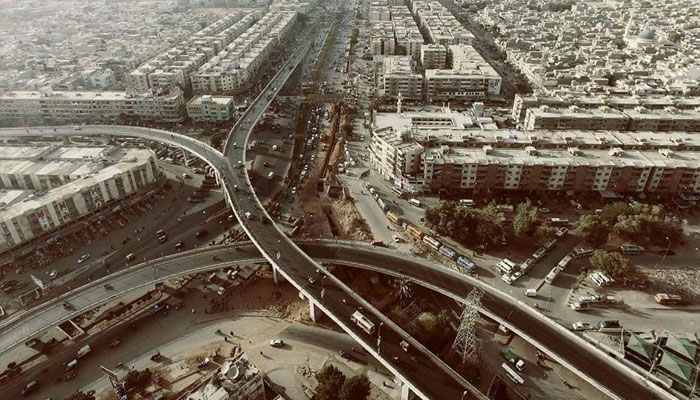Killer roads
Potholed, neglected and narrow roads are a recipe for disaster
There is a roundabout in Karachi that is named after a snake. Locals say that the number of accidents at this junction was too high; like a snake, the road kept devouring whoever came closer to it, compelling them to give it an unusual name. Unfortunately, this is true for most of the country’s road infrastructure. Potholed, neglected and narrow roads are a recipe for disaster, but our authorities have vowed to not go beyond lip service. This inaction has once again resulted in a fatal accident in Balochistan’s Turbat where a bus travelling to Quetta fell into a ravine, on Wednesday (May 29). At least 28 passengers out of the 54 onboard died on the spot. Killer roads across Pakistan have been calling for the attention of authorities for decades. In this incident, a bus tyre burst and overturned the vehicle. Roads on the two sides of a ravine are generally narrow, and even the slightest change in a vehicle’s direction can lead to a big catastrophe.
For adventurous tourists who visit such places perhaps once in their lifetime, travelling on this road is a thrilling activity. But for residents, it is a death trap, and yet even after multiple pleas and protests, both the federal and provincial governments have done nothing to resolve the issue. After the incident, officials said that some critically injured patients would be airlifted to Quetta, if needed. This underscores the lack of public infrastructure in small cities. Any city whose road terrain is a little unusual should be equipped with high-quality medical facilities to ensure that no one loses their lives because of their lack of access to healthcare units.
Fatal accidents like this one are unfortunately a regular occurrence in Pakistan. It is disappointing that safe and well-equipped communication networks have never been a priority for our governments. Last year, the chairlift incident in Khyber Pakhtunkhwa put a spotlight on the perilous journey residents take to carry out their daily activities. The situation in the rest of the country is not any better. Policymakers must improve the country’s road infrastructure. We cannot afford any more such accidents. It is equally important to keep strict checks on private transporters; their licence to operate should be revoked if their buses and other vehicles do not pass quality checks. Good road connectivity and efficient public transport will not only reduce the number of fatal accidents but also enable people from all parts of the country to participate in various economic activities. Pakistan is ignoring an issue that has the potential to transform the country for the better. It is still not too late to change course.
-
 It's A Boy! Luke Combs, Wife Nicole Welcome Third Child
It's A Boy! Luke Combs, Wife Nicole Welcome Third Child -
 Leading Astrophysicist Shot Dead At Southern California Home
Leading Astrophysicist Shot Dead At Southern California Home -
 Johnny Depp's Kind Gesture Towards Late 'Grey's Anatomy' Actor Eric Dane Before Death Laid Bare
Johnny Depp's Kind Gesture Towards Late 'Grey's Anatomy' Actor Eric Dane Before Death Laid Bare -
 How Princess Eugenie, Beatrice React To Andrew Arrest?
How Princess Eugenie, Beatrice React To Andrew Arrest? -
 Kylie Jenner 'convinced' Gwyneth Paltrow Is 'crushing' On Timothee Chalamet: 'It's Disrespectful'
Kylie Jenner 'convinced' Gwyneth Paltrow Is 'crushing' On Timothee Chalamet: 'It's Disrespectful' -
 Jemma Chan Reflects On 'difficult Subject Matter' Portrayed In 'Josephine'
Jemma Chan Reflects On 'difficult Subject Matter' Portrayed In 'Josephine' -
 Blood Falls In Antarctica? What Causes The Mysterious Red Waterfall Hidden In Ice
Blood Falls In Antarctica? What Causes The Mysterious Red Waterfall Hidden In Ice -
 AI Power Play: Nvidia Moves To Invest $30 Billion In OpenAI
AI Power Play: Nvidia Moves To Invest $30 Billion In OpenAI -
 Will Savannah Guthrie Ever Return To 'Today' Show? Here's What Insiders Predict
Will Savannah Guthrie Ever Return To 'Today' Show? Here's What Insiders Predict -
 Andrew Mountbatten-Windsor In A Fix Over New Disturbing TMZ Photos
Andrew Mountbatten-Windsor In A Fix Over New Disturbing TMZ Photos -
 Eric Dane Opened Up About Releasing His Memoir Just Two Months Before His Death Due To ALS Complications
Eric Dane Opened Up About Releasing His Memoir Just Two Months Before His Death Due To ALS Complications -
 Zendaya, Tom Holland Already Married? Actress Shows Off New Ring
Zendaya, Tom Holland Already Married? Actress Shows Off New Ring -
 King Charles Holds Emergency Meeting After Andrew Arrest: 'Abdication Is Not Happening'
King Charles Holds Emergency Meeting After Andrew Arrest: 'Abdication Is Not Happening' -
 Amazon Can Be Sued Over Sodium Nitrite Suicide Cases, US Court Rules
Amazon Can Be Sued Over Sodium Nitrite Suicide Cases, US Court Rules -
 'Vikings' Star Mourns Eric Dane's Death
'Vikings' Star Mourns Eric Dane's Death -
 Patrick Dempsey Reveals Eric Dane's Condition In Final Days Before Death
Patrick Dempsey Reveals Eric Dane's Condition In Final Days Before Death




